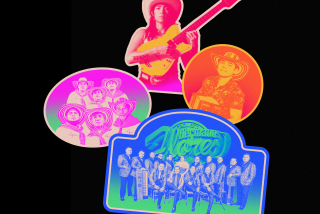Oliva Sextet Mixes It Up at Steamers
- Share via
Afro-Cuban jazz, a music that has long flourished on the East Coast, also has a well-established presence in Southern California, one that deepens as more Cuban-born musicians settle here.
Bands such as those of longtime California residents Francisco Aguabella and conguero Long John Oliva, who appeared Friday at Steamers Cafe in Fullerton, provide musical refuge for the more recent arrivals, who in turn, keep the music close to its roots.
Oliva, who has been in the United States nearly 20 years, is a disciple of Cuban pianist Jesus “Chucho” Valdez, longtime leader of Cuban jazz band Irakere (which produced saxophonist Paquito D’Rivera and trumpeter Arturo Sandoval). The Oliva sextet’s first set, a mix of tunes from Oliva and Valdez, showed the same type of crossover thinking that Irakere is known for, with its blend of Cuban rhythms and jazz fusion.
The music, powered by Oliva, drummer Ariel Cuevas and bassist Hector Ferreiro Jr., was often brash, occasionally based on riffs more rock than rumba and always churning with percussive interplay. The impassioned tenor play of David Urquidi, the staccato attack of trumpeter Giovanni Valdez and the sharp, broadly harmonized, Chucho Valdez-inspired play of pianist Zac Rae combined to create something that’s increasingly popular: an American style of Afro-Cuban jazz.
Even Cuban-based bands now reflect the influence of American contemporary jazz and pop, as heard in the recent Los Angeles appearances of Cuba-based charanga ensemble Los Van Van and other bands. Oliva’s music is an especially attractive form of this hybrid, true to its Cuban roots while slyly employing more direct beats and bass lines.
His group was at its best when its percussion was dominant. “Nota Cubana” opened with the combined rattle of three chekere (large, bead-draped gourds that are struck and shaken) before bassist Ferreiro added thumb-struck funk on his electric instrument. The opening number, “One Day or Another,” danced on a distinct, mid-tempo clave beat, giving rise to assertive solos from Urquidi and Valdez. In the middle of his solo, pianist Rae sounded honky-tonk that recalled Leon Russell.
Though not a particularly inventive timbale player (he took only brief stints at the timbales during the first set), Oliva is a dynamic conguero, constantly varying his sound. His solo moments, like the music as a whole, swung between traditional Cuban, jazz and funk beats, and he created faintly melodic passages by wise use of all four drums.
Listeners looking for pure Cuban tempos or blends of Cuban rhythms and mainstream jazz (rather than electric or fusion jazz) may find Oliva’s music too loud and too contemporary. But fans of Irakere and other crossover Cuban bands will find Oliva’s group exactly to their liking.
More to Read
The biggest entertainment stories
Get our big stories about Hollywood, film, television, music, arts, culture and more right in your inbox as soon as they publish.
You may occasionally receive promotional content from the Los Angeles Times.










